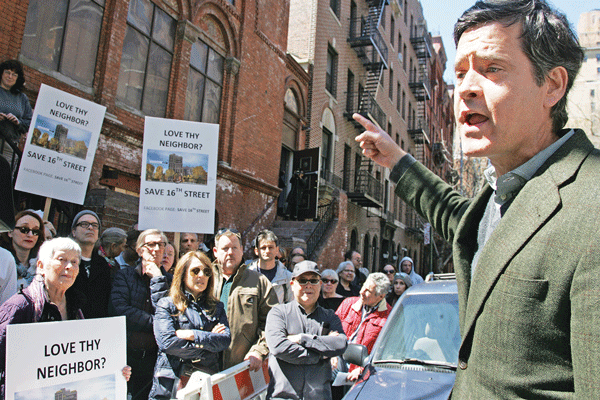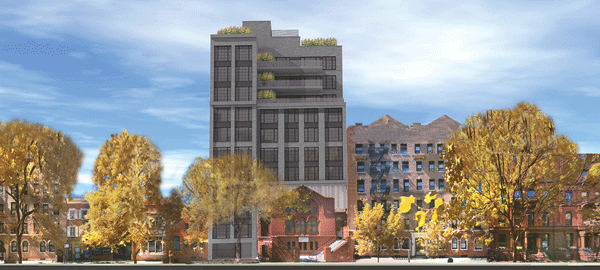
UPDATED: 3:15pm, April 10, 2014
BY SAM SPOKONY | Residents of West 16th Street, now joined by local elected officials, are continuing their fight against the “monstrous” and “out of scale” development currently underway on their block — and they’re also hoping for some divine intervention that could cut the planned building’s size in half.
The block residents have been outraged since last December, when Einhorn Development Group revealed they were building an 11-story condo building at 124 West 16th Street (between Sixth and Seventh Avenues), next to and above the 180-year-old French Evangelical Church.
Those plans were first laid back in April 2012 when Einhorn bought the former No. 124 building from the church for $4 million (later demolishing it). Later, in mid-2013, Einhorn agreed to purchase the air rights over the church itself, at 126 West 16th Street, for an undisclosed sum, according to past statements by the developer and church. As part of the deal, the church not only received more than twice the money necessary for $2 million worth of repairs to its aging facade and interior, but also gained 5,000 square feet of space in Einhorn’s new condo building, some of which it reportedly plans to rent in order to establish an endowment fund.
That air rights deal allowed the developer to bump up the building height from six to 11 stories, while keeping it as-of-right based on city zoning laws — but that hasn’t stopped the residents from railing against both Einhorn and the church.

“They’re disregarding the needs of the hundreds of people impacted by this development,” said West 16th Street resident Doug Halsey, who was joined by around 30 of his neighbors at a rally outside the development site on April 6. Amid chants of “Shame on you!” he also reminded the crowd that the Einhorns — Hal and Yiannes, the father-and-son leaders of the development group, as well as Hal’s wife Valery — have said they plan to live at 124 West 16th Street once it is built (completion is currently expected by 2016).
“It’s cruelly ironic that they plan to live in the building, because they’ll be bathing in the natural sunlight they will have literally stolen from the neighbors on their block,” said Halsey, referring to the fact that the rest of block’s buildings — as with most of the surrounding neighborhood — rise no higher than six stories.
Also joining the residents at that April 6 rally were State Senator Brad Hoylman, State Assemblymember Dick Gottfried and City Councilmember Corey Johnson, all of whom strongly called on Einhorn and the church to scale back the development in order to make it fit with the context of the rest of the block.
“Just because it’s as of right, doesn’t mean it is right,” said Hoylman. “It’s not right for [Einhorn] to block the light and air of so many of their neighbors, it’s not right for them to change the character of this historic neighborhood, and it’s not right that the French Evangelical Church is trying to get the top dollar for a development that’s going to ruin the neighborhood.”
Following much of the criticism already heaped upon its stark, stone and glass design, Johnson declared that the new building will “mutilate and scar” the block.
“And we are not going to sit by and allow that to happen,” he told the crowd. “The people who have lived here, who have made Chelsea what it is and who have made 16th Street what it is, are more important than glass luxury condos going up on a beautiful residential block.”
Einhorn declined to comment in response to the rally.
For all their effort, it seems at this point that the protesting residents and electeds may only wield the authority of a moral argument when it comes to battling against the developer. Einhorn’s plans are as-of-right in terms of zoning laws, according to the developer and the electeds who are familiar with the plans, and the air rights transfer from 126 West 16th Street is an as-of-right process, since the church is not landmarked, according to the Department of City Planning. So if the developer decides not to negotiate, there may be only one way in which they could legally be forced to scale back those plans.
That path would involve a major ruling, not by city officials, but by the Presbytery of New York City — the French Evangelical Church’s governing body — which must approve the sale of any church-owned property.
The Presbytery already signed off on the sale of the previous building at 124 West 16th Street, back before it took place in 2012 — but the same approval has not yet been granted for the sale of air rights over the church, according to publicly available Presbytery records.
In fact, Daniel Nicolas, a board trustee for the church, admitted to this reporter in a March 31 phone interview that he and his board “haven’t had a conversation yet with the Presbytery about the air rights.”
He then claimed his board was “under the impression” that the Presbytery doesn’t have to approve sales of air rights, and said he is currently seeking “clarification” on that issue.
In a later interview, Nicolas declined to comment on the April 6 rally. He also declined to comment on the fact that he provided false and misleading information about this issue — possibly with the intent of reframing the debate around Presbytery approval of the air rights — to a reporter for another publication.
As part of a March 28 article, Nicolas told a Bloomberg News reporter that the air rights deal took place in 2014, and the initial agreement between Einhorn and the church, which led to that sale, also took place within the past several months. (The Bloomberg reporter later confirmed that it was Nicolas who made those claims.) In fact, past statements by the church and the developer show that that deal was in fact struck in mid-2013.
So it’s unclear why there were apparently no air rights-related conversations between the church and the Presbytery during that subsequent period, and it’s equally unclear why Nicolas is now trying to claim that the air rights sale didn’t even take place in 2013. Many 16th Street residents have accused he and his church board of being disingenuous, for that and numerous other reasons, but Nicolas has not shed any further light on the matter.
In any case, the Presbytery will likely decide whether or not to approve the air rights sale at its mid-April board meeting, according to the Reverend Robert Foltz-Morrison, the group’s executive presbyter.
Foltz-Morrison has declined to comment in detail on the issue, saying that he still needs to review both the history of the plans and the current situation, but said that he may be ready to make a decision after that meeting. He added that a decision might have to be held off until the following month’s meeting, depending on that review process.
However, it’s also unclear what would happen, legally speaking, if the Presbytery were to deny the air rights sale, since a deal for that sale has apparently already taken place. At the very least, it would likely give the protesting West 16th Street residents at least some legal leverage in a fight to void that sale. And if any sale were to be voided, Einhorn, lacking those air rights, would have to stick with a six-story condo building, rather than building up to 11 stories.
Meanwhile, the residents have no intention of stopping their battle, as they hope to either convince Einhorn to have some mercy or the Presbytery to take a stand against the deal.
“We are not giving up,” said Jen Ollman, a block resident who helped put together the April 6 rally. “We’re trying to set a precedent not only for 16th Street and not only for Chelsea, but for the entire city. We must save our city from this kind of development, because we’re all neighbors here.”
CORRECTION: The original version of this article, which was published in Chelsea Now’s April 9 print issue and The Villager’s April 10 print issue, and also posted online for both papers on those dates, incorrectly cited an April 2012 document, filed through the city’s Department of Finance, as a deed of sale for the air rights to 126 West 16th Street. That document referred to a previous agreement regarding air rights transfers at the site, but had no bearing on any sale. The original version of this article also incorrectly stated that the Einhorn Development Group received city approval for the purchase of air rights from 126 West 16th Street — but that was based incorrectly on an earlier statement by the developer to a local resident, and such city approval is not legally required for a private air rights sale. The above article, updated on the afternoon of April 10, reflects these facts.






























